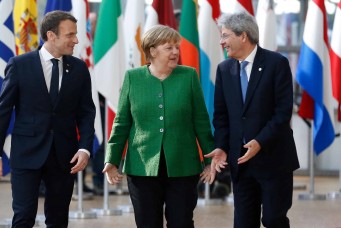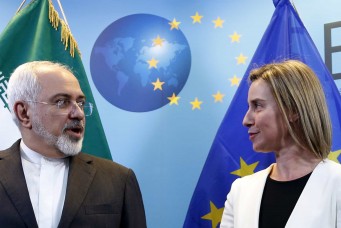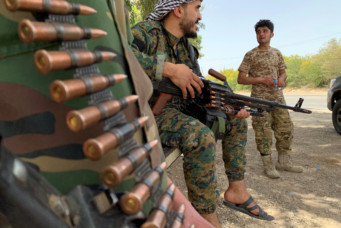Reluctant Power Europe
Will Europe’s approach of principled pragmatism toward the Mediterranean succeed in creating stability where previous approaches have failed?

European and Arab leaders during a summit between Arab League and European Union member states, in the Red Sea resort of Sharm El-Sheikh, Egypt, Feb. 25, 2019. Reuters/Mohamed Abd El Ghany
“The times when we could completely depend on others are, to a certain extent, over,” opined Angela Merkel at a rally in May 2017. “We Europeans,” the German chancellor continued, “have to take fate into our own hands.” Her statement, which came on the heels of Donald Trump’s entry onto the world stage at the G7 summit in Taormina, Sicily, was widely interpreted as foreshadowing a more self-conscious Europe. As such, Merkel’s speech tied into discussions surrounding European “strategic autonomy” which were prominent in the European Union’s (EU) 2016 Global Strategy, and which led to intensified European coordination in defense matters through the mechanism of Permanent Structured Cooperation (PESCO) after December 2017. In brief, Trump’s renewed insistence on burden-sharing within the North Atlantic Treaty Organization (NATO) as well as the broader transatlantic alliance and his perceived unpredictability seemed to have propelled European leaders to reconsider Europe’s role on the world stage.
A 2018 study by the European Council on Foreign Relations revealed that support for a stronger EU role in the neighborhood, both in the east and in the south, commands widespread support. While many differences persist relating to the balance between east and south, the level of ambition in EU common defense, and the role of NATO in this process, there is a new dynamism to the debates about the EU’s role as a global actor. This ambition was reiterated when European Commission President Ursula von der Leyen introduced the team she would be leading in a “geopolitical” commission and when Josep Borrell, Europe’s new high representative for foreign affairs and security policy, suggested in an op-ed published shortly after his appointment that Europeans “must relearn the language of power and conceive of Europe as a top-tier geostrategic actor”.
Against the background of such discussions and almost four years after the publication of the EU Global Strategy (EUGS), it is important to take stock of how the EU’s approach to the Mediterranean region has developed. Focusing on two policy areas—the EU’s diplomatic efforts surrounding the Iran nuclear deal and its attempts to shape the course of violent conflicts in Syria and Libya—I argue that much remains to be done in pursuit of European strategic autonomy. In particular, it is crucial to recognize that European strategic autonomy must be more than just a response to President Trump’s unpredictability. Structural pressures will continue to divert U.S. attention elsewhere, even if a potential Democratic president after the 2020 elections might restore American multilateralism. Rather than hoping for a return to normalcy, European strategists and policymakers should therefore prepare for a post-Trump world in which demands on European foreign and security policy remain high. Europe must take greater responsibility: not as a stopgap measure until multilateral globalism is restored as the driving force of U.S. foreign policy and not against the interests of the United States, but as part of a new burden-sharing arrangement anchored in strong transatlantic ties.
The EU Looks South
The EU’s strategic approach to the Mediterranean has evolved significantly over the last two decades. If the union’s “big bang” enlargement in 2004–2007 brought the need for a coherent neighborhood policy into focus by extending the geographical range of the European periphery, the Arab uprisings of 2011 constituted a watershed moment for the EU’s approach to the Mediterranean. Both the 1990 Barcelona Process as well as the 2003 European Security Strategy (ESS) had been driven by the strategic vision of extending the European model of democratic internal organization and multilateral integration propelled by free trade.
These policies “often read like contemporary applications of Immanuel Kant’s treatise Perpetual Peace,” as political scientists Rosanne Anholt and Wolfgang Wagner appropriately suggested.
Quoting the 2003 ESS, the ambition was to promote “a ring of well governed countries to the east of the European Union and on the borders of the Mediterranean” with whom it could “enjoy close and cooperative relations”. The European Neighbourhood Policy (ENP) was established as a set of instruments meant to achieve this goal.
A strategic vision relying on the prospect of sustained peace based on common liberal norms and shared prosperity does not have much traction in the current context, however. The 2011 Arab uprisings and their aftermath upset such optimistic notions, if indeed they ever constituted appropriate readings. From a European perspective, regional upheaval and instability in the Mediterranean since 2011 is sobering in a double sense. To begin with, democratic aspirations did not take hold in the region, with the exception of Tunisia. While this did not necessarily vindicate arguments suggesting that Europe’s southern neighbors were “not ready” for democracy, it did demonstrate that upholding democratic political processes in an inhospitable environment required significant political investments, both by domestic and international actors. European determination to support democratization in Tunisia is a consequence of this realization. Secondly, developments on the ground after 2011 foreshadowed a regional playing field characterized by authoritarian retrenchment, violent conflict, and increasing influence by regional and outside powers at odds with European interests and values. The EU’s new emphasis on “principled pragmatism” was a reaction to a regional situation which was unlikely to be moved by the EU’s traditional soft power instruments.
On the institutional level, a review of the ENP in 2015 and the development and adoption of the EUGS in 2016 signaled a reevaluation of the vision for and instruments of European policy toward the Mediterranean. The EUGS established resilience as the new strategic leitmotif of EU objectives in its periphery. While the concept is flexible enough to be seen as a continuation of the ESS’s emphasis on good governance and democracy by some and a turn toward stabilization policies by others, it is clear that the EU’s overall assessment moved from an emphasis on opportunities to one focused on challenges. Reflecting both the significance of these challenges as well as the EU’s limited means, the EUGS refers to “principled pragmatism” as the new European approach to foreign affairs in the Mediterranean and beyond.
A Long Way to Strategic Autonomy
How has the EU fared thus far in its attempts to reach strategic autonomy? The answer is: better than expected and worse than necessary.
On the plus side, the 2016 election of Donald Trump as U.S. president has galvanized European attention; the prospect of his reelection in 2020 continues to do so. Epitomizing this perspective, a recent op-ed by the EU’s foreign policy chief Josep Borrell entitled “Embracing Europe’s Power” referred to the United States, China, and Russia in the same paragraph as “global strategic actors” and emphasized the need for Europe to devise “credible approaches”to dealing with each of these actors. Most telling, however, is that the essay did not even mention the transatlantic bond or NATO. While some of this must be seen as posturing, it is evident that American and European positions on a range of issues have diverged more strongly than ever before.
From the Iran nuclear deal to the American withdrawal from Syria to the Trump administration’s approach to the Palestinian question, Europe often finds itself opposed to U.S. actions in the southern neighborhood.
Instances such as these also reveal Europe’s limitations. Take the Iran deal—also known as the Joint Comprehensive Plan of Action (JCPOA)—as an example. European partners to the deal—France, Germany, and the United Kingdom—insisted on wanting to maintain the agreement in the wake of the American decision to unilaterally withdraw in May 2018. The establishment of the Instrument in Support of Trade Exchanges (INSTEX), which was designed to protect European firms trading with Iran from U.S. sanctions, was a clear sign that Europe was willing to risk tensions with the United States over this issue. In the context of increased tensions between the United States and Iran in January 2020, however, the European parties to the JCPOA decided to trigger the agreement’s dispute settlement mechanism, thus inching closer toward the U.S. position. INSTEX was only activated in the context of the COVID-19 pandemic, with the U.S. turning a blind eye to European shipments of medical equipment to Iran.
From a larger perspective, the example of the Iran nuclear deal illustrates a major limitation of the European approach: even while taking an independent position, the European stance on the JCPOA was clearly geared toward keeping the agreement alive while hoping for a change in the U.S. position, potentially under a new president. As such, it was a stopgap measure, not an independent contribution to shaping the regional security environment. In the specific case of the JCPOA, this approach might be understandable at least as long as there is a chance that Trump will not get reelected. In the larger scheme of things, however, it reveals that European foreign policymakers still hope for a return to the status quo ante in terms of the American approach to the region, rather than contemplating ways in which European policies could achieve specific goals without, and sometimes even in opposition to, the United States.
A second facet of this same limitation was highlighted in the European response to violent conflict, particularly in Syria and Libya. When President Trump announced the withdrawal of troops from northeastern Syria in October 2019—thereby practically greenlighting the Turkish invasion which was to follow—European capitals were not merely taken by surprise, but clearly lacked contingency plans for such an eventuality. When the then-new German Defense Minister Annegret Kramp-Karrenbauer proposed the establishment of an international security zone in northern Syria, she was greeted with skepticism in all quarters. It became immediately apparent that the initiative had not been coordinated within NATO or the EU and did not even have full support on the national level in Germany. Given a likely Russian veto it was clear that a United Nations’ backing for such an initiative would not be forthcoming. And, while NATO allies reacted politely to the proposal, none of the major military powers volunteered their capabilities, putting the mismatch between Kramp-Karrenbauer’s political ambitions and the availability of European, let alone German, capabilities into embarrassing relief.
The ongoing Berlin process with respect to Libya holds similar lessons. To begin with, given divisions among European partners—in particular France and Italy—Libya for a long time highlighted another weakness of European foreign policy: the tendency by larger member states to prioritize national over European interests. Only the increased involvement of Russia—on the side of the Libyan National Army and General Haftar—and of Turkey on the side of the UN-backed government, created the conditions necessary for the Berlin process to even take place. And even then, the agreed-upon ceasefire and arms embargo remained largely ineffective, as no enforcement mechanisms could be agreed on. When Borrell suggested to the German magazine Der Spiegel that the EU should contemplate military means to enforce the arms embargo in Libya, this step did more to highlight intra-European divisions then to push the Libyan file forward. The EU eventually did launch a new naval mission—EUNAVFOR MED IRINI or Operation Irini—to help enforce these decisions, which took over from EUNAVFOR MED SOPHIA (Operation Sophia) and will be headquartered in Rome and led by the Italian navy under the former Sophia commander Rear Admiral Fabio Agostini. Given that Operation Sophia could not deploy naval assets since December 2019, the crucial question will be whether member states will be willing to step up their contributions to this new mission. Given the current global health crisis, it is not clear whether the EU and its member states will be able to keep their focus on the situation in Libya and on the Mediterranean more generally.
The Berlin process can thus be seen as a success in the areas of traditional European strength: diplomacy and mediation. It simultaneously demonstrates that the EU is far from the type of “joint-up” action demanded in the EUGS; progress on the diplomatic level needs to be sustained by other forms of influence, and European efforts can only be effective if the main European actors truly speak with one voice. Both of these latter elements are lacking in the European approach to Libya.
Embracing Power?
Europeans continue to punch below their weight in foreign policy, particularly when it comes to their southern neighborhood. Some of this has to do with the absence of a common European strategic culture which, coupled with the at times complex decision-making structures in the EU, can make for unwieldy and lengthy procedures.
It is also at least partially a result of a lingering sense of nostalgia in European policy circles for a better time when the United States led and the Europeans could follow—or, some would say, hide behind—their transatlantic cousins.
Trump’s election has begun to erode this assumption, but the realization that at least some part of the U.S. retrenchment is structural still has to hit home.
The EU has reacted to these challenges internally. The notion of European strategic autonomy has gained increased traction across European capitals, even if the precise meaning remains subject to some debate. The deepening of defense cooperation through PESCO as well as a new-found assertiveness on the discursive level also belong to this category. As discussed above, Europe’s approach to its southern periphery holds many challenges. Most fundamentally, those hoping for a stronger role of the EU in foreign and security affairs must also consider ways of assuring that such a role is not undermined by the national priorities of member states. The coordination of different interests and positions does not emerge spontaneously, but must be constructed through active consultations. The structures for such consultations are available, but the political will to use them is sometimes missing.
Moreover, Europeans need to think hard about the implications of a stronger European role in their southern neighborhood for transatlantic relations. While Trump’s unpopularity across Europe has served as a unifying element, there is a risk that the European strategic discourse becomes trapped in defiance. For some such defiance might reflect the hope for a restored transatlantic relationship after Trump, for others a deeper disagreement with elements of the U.S.-sponsored regional order.
Under the conditions of a Trump presidency, these differences among Europeans are overridden by a common opposition to the policies of his administration. Europeans would be well advised, however, to think about Europe’s role in the region under the conditions of a U.S. foreign policy which is more traditional in style—yet might still require a greater European part to play. The Trump presidency has clearly damaged the reputation of the United States across Europe, yet Europeans on the whole remain largely pro-American. Defining a stronger European role in the Mediterranean in coordination with the United States, while accepting that there remain different priorities in some areas but substantial commonalities in others, is an important task for the coming years.
Kevin Koehler is assistant professor at Leiden University. His research focuses on Middle Eastern and North African politics as well as security issues in the region. His work has been published in journals such as Security Studies, Comparative Politics, Comparative Political Studies, and Mediterranean Politics, among others.
Read More




